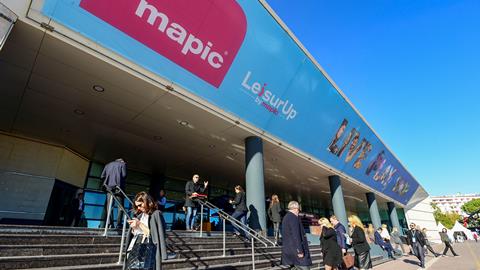As Mapic 2024 wraps up in Cannes, retail landlords across Europe will be thinking hard about the future of the asset class, touched by topics as broad as the experience economy and the rise of artificial intelligence (AI).

At this year’s event, a roundtable dubbed ‘Retail and property AI: optimise, personalise, communicate’ gathered industry leaders to discuss AI's impact.
Alessandro Zanotti, managing director at Accenture Song, highlighted how AI fosters customer innovation and creates new opportunities for enriched experiences.
Charlotte Journo-Baur, CEO of Wishibam, illustrated how AI enables small businesses to become more agile, while Giulia Staffieri, marketing director at Leroy Merlin Italy, demonstrated how AI enhances customer-focused strategies.
According to statistics released at this year’s Mapic, some 78% of companies have integrated AI into their operations, yet only 40% are experimenting with generative AI. AI’s potential is vast, with predictions indicating a 40% increase in retail productivity.
About 34% of tasks can be automated, and an additional 7% can be optimised using AI. Generative AI applications are revolutionising key areas such as content creation, customer interaction, and personalised recommendations.
In many respects, excitement over AI’s potential applications has replaced the fear that it will destroy jobs or remove the human dimension from retail.
Ben Yexley, head of business development at AI-powered automation specialist askporter, said that retail leaders were utilising AI to improve their productivity without significant additional expenditure. His firm is currently in talks with one of the world’s largest online retailers about shortening downtimes at their sorting and packing locations.
‘They are hoping to use AI and smart diagnostics onsite to increase their uptimes, in a business where minutes make a lot of difference to efficiency and ongoing costs,’ he explained.
The experience equation
Retail landlords and operators have heard plenty in recent years about the rise of the experience economy and consumer preferences for ‘experiences over things’.
During a keynote by Eric Costa, president of Citynove, titled ‘What if emotion was the ultimate parameter in the retail equation?’, delegates were introduced to a laboratory approach taken by Galeries Lafayette’s real estate arm to analyse and improve customer journeys within its stores.
By working with academics and semiologists, Citynove adopted a near-scientific method to understand retail dynamics, exploring questions such as why we buy fashion, why we leave our homes, and why we press the lift button to close the doors faster. Costa’s speech suggested that fashion, for instance, reflects our projection of a better future and fulfils a need for optimism.
The resulting Annecy project served as a laboratory to design spaces that reduce stress. Within four months, results were clear: customer footfall and conversion rates exceeded expectations, surpassing those of other French stores, excluding Haussmann. Rather than immediately maximising rents, the team prioritised medium-term performance. This approach, rooted in emotional engagement, proved worthwhile, confirming the importance of designing for positive customer experiences.
The rise of leisure
Leisure remains a key topic for landlords looking at filling large units left by the demise of fashion chains, while seeking ways to account for the continuing exodus of hypermarkets and white goods retailers towards retail parks.
Last month, shopping centre giant URW secured entertainment tenant Capital Theatre for a new, permanent 36,000 ft2 (3,300 m2) venue, located on the ground floor of the former Debenhams unit at Westfield London. The theatre will host Dirty Dancing – The Classic Story on Stage as its inaugural production in October 2025, following its success in the West End.
Westfield London has already made a significant commitment to leisure, with 180,000 ft2 of active leisure space and an additional 83,000 ft2 in development. Attractions currently include music and events venue Exhibition London, plus mini-golf, climbing, and bowling experiences like Sixes, Puttshack, City Bouldering, and All Star Lanes. On top of Capital Theatre, the immersive football experience TOCA Social will also launch in the centre next year.
Immersive experiences
Constantin Wiesmann, director of leasing UK at URW, said that the signing of Capital Theatre reflected ‘the growing demand for immersive, diverse experiences in retail environments and underscores our vision of Westfield as a dynamic destination where culture and entertainment lead the way’.
‘Entertainment is no longer an element in the corner of a shopping centre, it’s taking centre stage,’ said Reinhart Viane, business development director at leisure specialists KCC. ‘It has become the glue in a mixed-use or retail environment.’ For Viane, destinations which often have the same retailers as neighbouring malls need unique leisure facilities today to help them stand out.
‘It’s about creating one location which has something to offer the entire family, where everyone can go and spend hours,’ he added. ‘It is also increasingly easier to convince retail tenants to come to a certain location if you can show them that there is an entertainment concept there which is acting as a magnet for the whole centre.’
This year’s Mapic brought together 4,400 participants, including 1,800 retail representatives, a 12% increase compared to 2023. Major international players such as AEW, CBRE IM, Pradera, Klepierre, URW, Ingka Centres, Nhood, Altarea, Hammerson, IGD, Apsys, Mercialys and Sonae Sierra all took part.
With an expanded area and a new space dedicated to brand licensing (IP), LeisurUp, the zone dedicated to leisure and immersive experiences, brought together leading players such as Bandai Namco, Citywave, Cités Immersives, Hasbro, Dama Dreams, Dedem, Hupalupa, Smiley, QubicaAMF, Pausa, TF1 Licensing, Universal, Walltopia, and Zero Latency VR.










